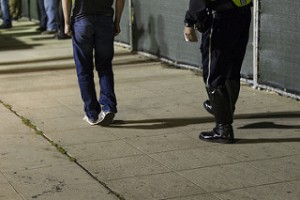 Conducting a test as sensitive or as legally exacting as a roadside sobriety test is not only a challenge for police officers, but also a challenge for drivers, potential defendants, attorneys and courts. Very often these tests can be inadvertently compromised through no fault of anyone either at the scene or after the fact. Here are some of the more common problems drivers and defendants might encounter with a test that may not be as conclusive as claimed.
Conducting a test as sensitive or as legally exacting as a roadside sobriety test is not only a challenge for police officers, but also a challenge for drivers, potential defendants, attorneys and courts. Very often these tests can be inadvertently compromised through no fault of anyone either at the scene or after the fact. Here are some of the more common problems drivers and defendants might encounter with a test that may not be as conclusive as claimed.
Challenges for the Officer
Police officers rarely have the clinical or training to recognize what are, by definition, medical symptoms. Therefore, any test which relies on the officer’s interpretation of another person’s physical condition can be challenged on three bases:
The police officer does not have medical training
- The officer did not take enough time to evaluate the results
- The police officer misinterpreted his or her observations
Driver’s Physical Condition
Because police officers generally lack medical training, the medical condition of the driver can play a significant role in confusing a sobriety test. Symptoms of inner ear infections, inability to walk normally, fatigue, medications and a wide variety of other factors might prevent an otherwise unimpaired driver from successfully completing a sobriety test.
- Most of these conditions would not escape a physician, but could very likely escape the notice of an untrained police officer.
The Complexity of the Test
Like any scientific or medical experiment, the procedures for and conditions under which a field sobriety test are conducted are absolutely crucial to obtaining accurate results. There is a reason similar experiments are not conducted on a dark rocky dirt shoulder of the road with flashlights and car headlights for illumination with traffic roaring past at 70 miles per hour.
- Conducting and then interpreting the results of such an important test that has both legal and medical ramifications would be a major challenge even if the testing officer were a member of both the Bar and the Medical Board.
No Grounds for Comparison
When a test is conducted, the results may or may not be meaningful. The reason is because there is no way for a police officer to know what “normal” looks like if they are only there to witness what they allege is “impaired.”
- Suppose the driver looks or acts in a way that would make a police officer suspect they are impaired when in fact they are not?
- How can the officer possibly know the difference? The answer is they can’t, and this is one of the most common ways experienced traffic attorneys can get either an acquittal or an outright dismissal during a DUI case.
Certain Kinds of Tests
Some drivers should not be subjected to certain kinds of tests. For example, a balance test administered to someone who is overweight can present a wide variety of physical problems that, while they may not completely invalidate the test, will very likely call the results into question.
- People with certain medical conditions might register a higher blood alcohol level than others, even if they aren’t impaired.
- These conditions are rarely controlled for a 2AM on the side of a rural highway, which is yet another reason roadside sobriety tests may not be as reliable as they should be.
To conclude, we would like to reiterate that none of these limiting factors should be considered a free pass to drink and drive. At the same time, the fact someone stumbled because they were 100 pounds overweight shouldn’t automatically result in a drunk driving conviction. The roadside sobriety test is one tool among many, and should be given appropriate weight if someone is facing charges for impaired driving or driving under the influence.
www.flickr.com/photos/41802269@N03/14258257822/
Scott Desind
Latest posts by Scott Desind (see all)
- How to Request the County Seat and Fight Your California Traffic Ticket - May 21, 2023
- Don’t Even Touch That Cell Phone - July 13, 2022
- Innocent Until Proven Guilty - March 2, 2020

